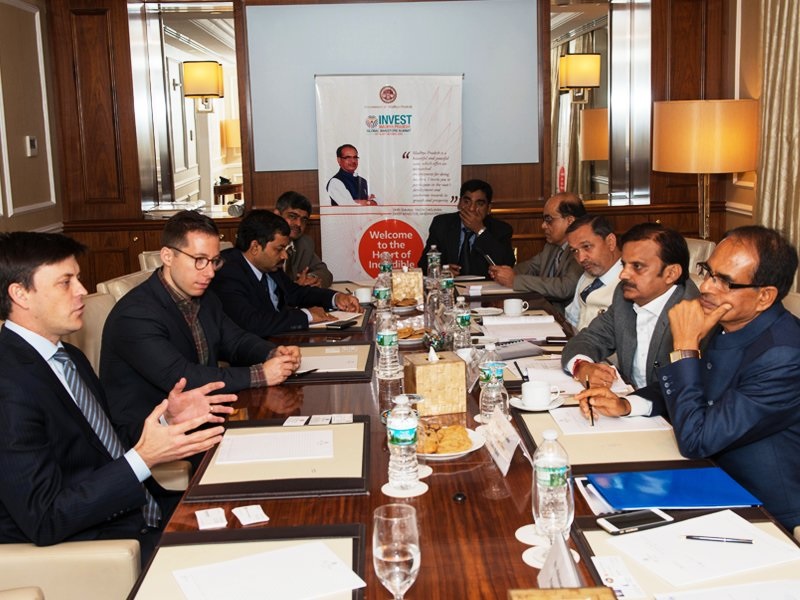COLUMN: India’s image gets a beating time and time again; investors wary.

 NEW YORK: Midway through an hour-long election rally-like speech rendered at a private reception held for him at the Indian Consulate in New York, last month, the Madhya Pradesh chief minister Shivraj Singh Chouhan, from making a pitch for investment in his state, citing umpteen measures he had undertaken so far to alleviate the lot of poor people and especially women in the second biggest state by area in the country, suddenly changed the topic to America. And how India was better than America.
NEW YORK: Midway through an hour-long election rally-like speech rendered at a private reception held for him at the Indian Consulate in New York, last month, the Madhya Pradesh chief minister Shivraj Singh Chouhan, from making a pitch for investment in his state, citing umpteen measures he had undertaken so far to alleviate the lot of poor people and especially women in the second biggest state by area in the country, suddenly changed the topic to America. And how India was better than America.
Speaking in eloquent Hindi, Chouhan (who with his frequent jaunts to the US to lure investors Narendra Modi-style, seems to suggest hunger for higher seat in the political spectrum in India) ridiculed the seemingly selfish, zombie-like modern folks who stay immersed in their headphones (he couldn’t find the exact word for it, but managed to convey with his gestures and an ironic description of having a gadget on one’s ears), as they walk on streets in Manhattan. Compare that to India, he pointed out, where people ‘knew’ each other, greeted each other warmly on streets, where festivals rolled out one after the other in a festoon of celebrations, a seemingly utopian land where even tribals, despite being dirt poor, are ‘happy’, dance with joyous abandon.
Chouhan didn’t stop there, as an appreciative audience, comprising mostly of community having their roots in Madhya Pradesh, guffawed. He went on to lambast capitalism, saying that it’s not money that make people happy. Now, most people in the audience, including this writer, did understand what Chouhan was trying to convey. After all, if there’s one thing NRIs miss the most, after their family in India, it’s those festivals; which despite being duplicated with fervor, lacks the exact spirit, and camaraderie.
But it’s also a fact that the one thing that most NRIs, including those from Madhya Pradesh, don’t miss one bit about India, are the growing cases of crime against women, vindictive regionalism, growing divide between the rich and poor, and civil disobedience, apart from the nagging feeling that the country could be headed to perdition if growth slows down, enough jobs are not created every month.
Dishearteningly, too, it’s become a common feature for deadly civil riots to break out with alarming frequency, public property to be demolished with impunity – denting a state and the country’s economy, at virtually any social or cultural unrest that has the support of some nefarious elements, who can gather mobs at will.
Hillary Clinton’s words to highlight some right wing voters who support her rival in the presidential race, Donald Trump, as ‘basket of deplorables’ is an apt description of those who share and favor the businessman’s xenophobia and racism, are misogynistic, hate immigrants, and believe in white power and supremacy.
But if those words by Clinton, ‘basket of deplorables’ were to be applied to India, it would make far more sense.
Despite prime minister Narendra Modi’s best efforts to promote the ‘Make in India’ program, and reach out to investors globally, he and his cabinet have not been able to infuse the supreme confidence for foreign investors to make a grand beeline for India, pour money into manufacturing in the country.
The reasoning could be many but here are some conjectures:
‘If India cannot control riots that happen close to their biggest cities, like New Delhi and Bengaluru, within a few miles of those city’s borders, what’s the guarantee that my business will operate hassle-free? If India cannot stop civil disobedience, riots and strikes happening in the heart of their wealthiest suburbs in the nation close to New Delhi and Bengaluru, how safe is my business going to be?”
Some more such reasoning to dissuade investors from embarking on projects in India could go like this:
“If the Indian government cannot stop gang rapes of their women and children, murder of men belonging to certain communities for suspicion of eating beef, and even do fact checking of daily cooked food for beef – like what’s happening in Haryana – then what’s the guarantee that my partners and I, business would be safe from such cow vigilantes and anti-social elements? Is there a danger to us being lynched?”
“If there’s water shortage in Bengaluru, Chennai, strikes by workers and riots on the streets, how wise is it to open a hub in Bengaluru or the state of Karnataka? Or Tamil Nadu? Will I make money or lose money?”
Conjectures or not, the truth is that India’s ‘basket of deplorables’ is fast assuming dangerous proportions, to its own citizens. The agitation earlier by Maoists and radicals was an issue that the West, and Indians removed from the hot spots of those agitations, chose to ignore, just like the threat of terrorism; dismissed it as issues part and parcel of India. It was comforting to know that India was combating it, trying to eradicate the ills of revolution.
But businesses globally are bound to be quickly disillusioned by new, modern incidents in India like the Jat agitation which saw 30 lives being lost in riots and hundreds of crores of property being destroyed in Haryana – with news coming in today that the All India Jat Aarakshan Sanghrash Samiti has declared that the agitation will resume next session of Parliament; Patidar agitation, which may engulf Gujarat again; newly announced Maratha reservation agitation which may hit Mumbai too; banning of beef and its deadly repercussions, now seen in states like Uttar Pradesh and Haryana – with spotlight on cow vigilantes, if they are to be blamed for the gang rapes of two females from the Muslim community in Mewat in Haryana; growing number of gang rapes of women on the highways of India, in the northern states; and not the last or the least, the ugly Cauvery River row, which might flare up anytime in the future. There’s real danger Bengaluru may slowly wither away in the future, its suburbs die a natural death because of lack of water, congestion, civil strife.
India’s stark fact is also that these ‘basket of deplorables’ has a cascading, debilitating effect on other sectors of the economy.
Take real estate for example. Already reeling from some tough measures by the government to curb black money and a hike in cost for buyers, it’s going to head down south in places affected by the Cauvery Row. The irony is that a year ago, most potential buyers in places like Bengaluru would have been looking to invest in places close to upcoming Metro train lines. Now, the new and complicated math would be, is there a water line running there or not, what water harvesting measures are being taken by developers? How much would water cost in the future, on top of the mortgage, if one has to rely on tankers?
If India has a grim uphill battle to face regarding water scarcity in the future, then conversely, streets in top cities like Delhi, Bengaluru, Kolkata and Mumbai getting submerged after every downpour is a downright shame for a country which aspires to be one of the best in the world, and be recognized as such.
The Secretary of State John Kerry on a recent visit to India’s capital, actually ended up asking some IITians after he got stuck in traffic after rainfall, “Did you come here by boats?” Mind you, Kerry asked this question in the heart of New Delhi, not Majuli, in Assam, India’s largest island district.
It’s really one thing for Modi and Chouhan to lure investors. And quite another for the world to see that the Indian government and state governments are helpless in the face of agitations and crimes, not in control of what’s happening in India.
Chouhan’s program for the lower strata of society is admirable, and his upcoming programs like food at discounted prices at canteens, is laudable. However, he needs to stem the crimes against women in Madhya Pradesh, which records some of the highest number or rape cases in the country. Modi needs to focus on immediate measures to stop the ‘Break India’ movements, not just bolster the ‘Make in India’ campaigns.
If not, the ‘basket of deplorables’ as it floats along the length and course of India, will ruin the country for generations to come.
(Sujeet Rajan is the Editor-in-Chief, The American Bazaar. Follow him @SujeetRajan1).



